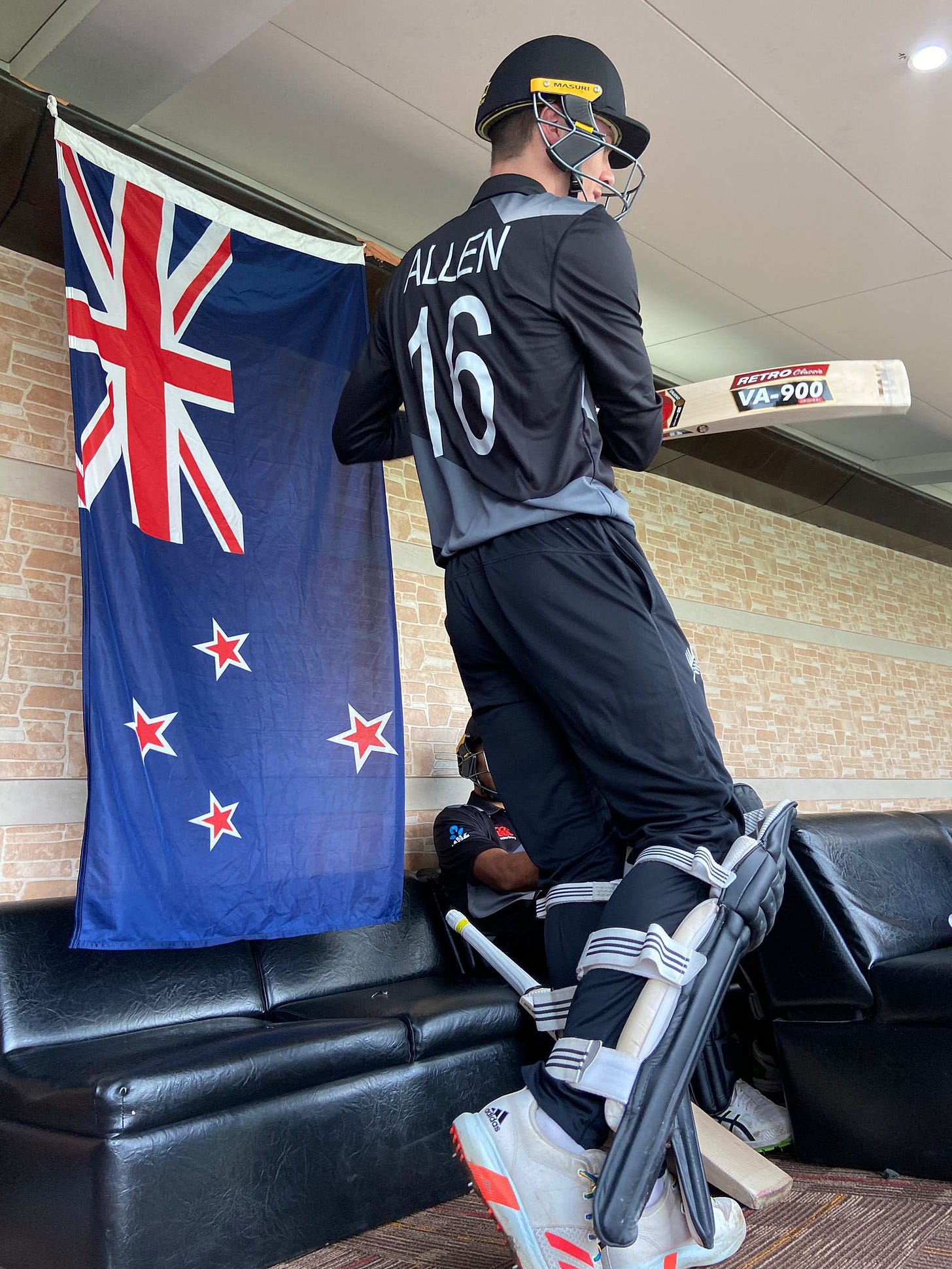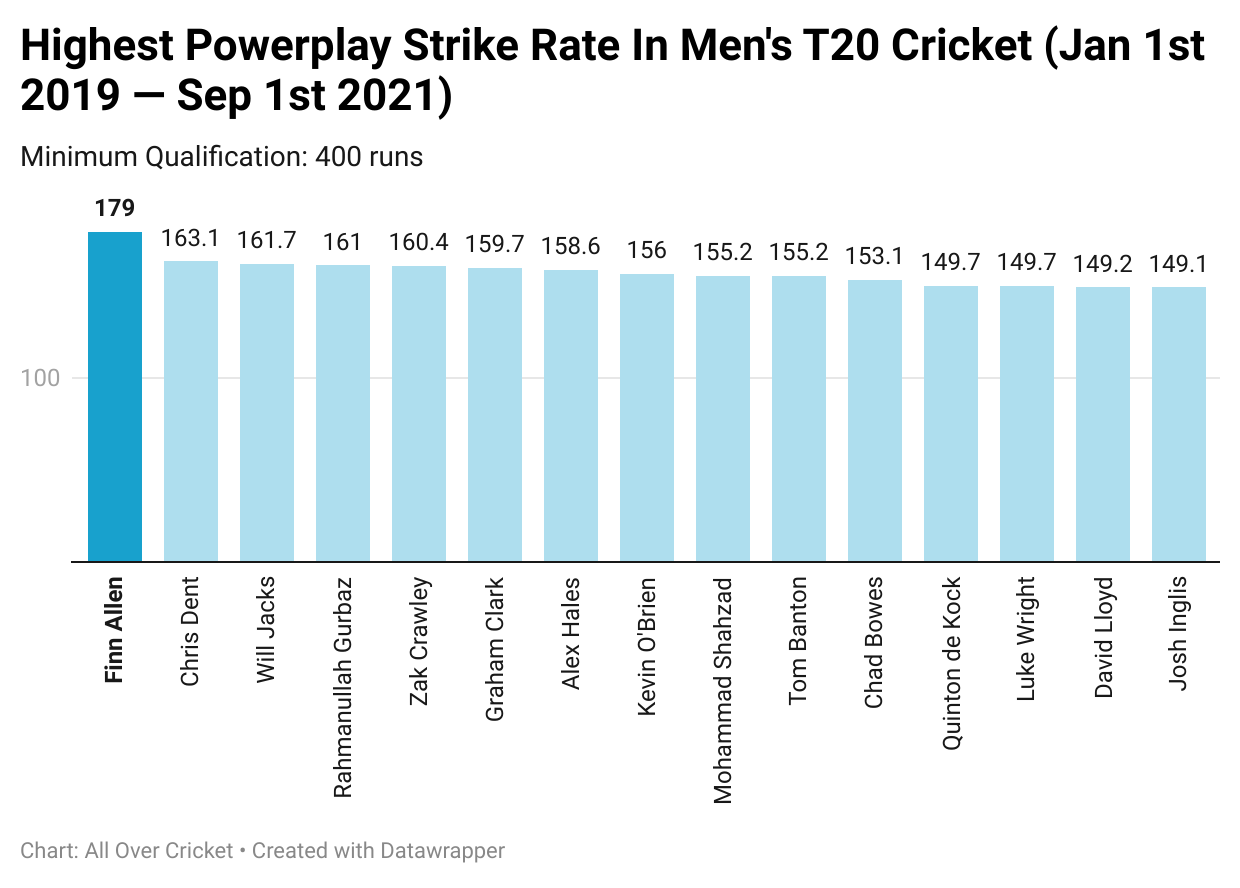Should Finn Allen have been picked for the World Cup?
Jay Dansinghani looks at the numbers
The last month hasn’t gone to plan for Finn Allen. After exploding onto the scene with a breakthrough season for Wellington and earning contracts in T20 leagues around the world, he was controversially left out of New Zealand’s squad for the Men’s T20 World Cup in October. To make matters worse, he tested positive for Covid-19 when New Zealand arrived in Dhaka, which forced him to go into isolation for a week.
In the ongoing T20I series between Bangladesh and New Zealand, Allen’s absence has been felt not just by a second-string New Zealand line-up but also by anyone who misses the typical excitement and pyrotechnics of powerplay cricket.
Before the 3rd T20I, the powerplay scores from both sides read 18/4, 22/2, 36/0, and 28/2.
Then in walked Finn Allen, the single best powerplay batter across either squad. And he wasted no time whatsoever.
Savage against spin
Off just the third ball of his innings, he used his feet to get to the pitch of a Mahedi Hasan delivery, driving it against the spin and past mid off for his first boundary. Two balls later, he moved across his stumps and swept the off-spinner to the square leg boundary. Allen would continue to diversify his strike points in the next over, going deep into the crease to punch left-arm spinner Nasum Ahmed off the back foot and past a diving fielder at cover.
Despite chipping a signature Mustafizur Rahman cutter to mid on in the third over, he’d given his side a quick start that allowed them to reach 40/1 at the end of 6 overs, the highest powerplay score of the series thus far.
Speaking to All Over Cricket, New Zealand’s stand-in Coach and Wellington Head Coach Glenn Pocknall did not comment on Allen’s exclusion from the World Cup squad. Pocknall, however, explained why he was keen to sign the aggressive batter from Auckland, where he’d only made two first-team appearances in two seasons.
“A big area he has improved on is hitting more areas against spin. His power has always been evident and now he can add finesse in his shots by maintaining strong positions at the crease.”
Allen’s numbers back up Pocknall’s observations. The Wellington opener strikes at 161 against spin in T20 cricket, while averaging 35.3. These numbers are very important when you consider that the World Cup will be staged in the UAE on surfaces that often aid spin.
Out of all batters included in the Black Caps’ World Cup squad, only Mark Chapman can match Allen’s explosiveness, striking at 165 since the start of 2019. However, his average in that period is south of 25.
It’s interesting to compare Allen to the three opening options ahead of him in New Zealand’s pecking order. Against spin, Devon Conway and Tim Seifert average 100 and 51 respectively. While Conway strikes at an impressive 140, Seifert’s strike rate is considerably lower at 123. Seifert, of course, has the added advantage of being the only specialist wicket-keeper in the squad in addition to being an option in the middle order. His numbers, arguably, are good enough to discourage New Zealand from opting for a makeshift gloveman in either Devon Conway or Allen himself.
Glenn Phillips is another keeping option, but giving Seifert the gloves frees up Phillips to bowl his ever-improving off-spin. This could prove useful in games where New Zealand wants to play an extra batter without compromising on the overs of spin available to Kane Williamson.
However, the case for Guptill’s inclusion ahead of Allen isn’t as strong as the case for Conway or Seifert. Since 2019, the veteran opener averages less than 25 against spinners, striking at 136. Clearly, he is less consistent and less dangerous against spin than Allen. What works in Guptill’s favour is his experience. Opening with Allen and Conway might be considered risky as they’re both inexperienced in T20Is.
However, the deeper you dig into the numbers, the more they support the idea that New Zealand should be taking a chance on Allen.
Powerplay Pro, Boundary Beast
Before signing Allen from Auckland, Pocknall was impressed not only by his prowess against spin but also with how much time he had against genuine pace.
“He faced a very quick spell against Ben Sears when we played against him at Auckland, and he was the only batsman who had time. Finn showed me that he had the raw ingredients to be able to perform at higher levels,” recounts Pocknall.
Pocknall’s assessment of Allen is on target. He strikes at 176 against pace with an average of 32. These numbers should come as no surprise to anyone familiar with his exploits in the powerplay.
Whichever way you look at it, Allen is an absolute maniac when the field is up. Of all batters to have scored at least 400 runs in T20s during the fielding restrictions since 2019, Finn Allen’s strike rate of 179 is easily above anyone else’s. Gloucestershire’s Chris Dent is a surprising but distant second with 163.
Moreover, since 2019, Allen has hit 28% of his deliveries for a boundary. That’s a better boundary percentage than anyone with at least 1000 T20 runs since the start of 2019. Andre Russell is the only other player who gets close, hitting 27.7% of his balls for four or six.
Although Russell bats almost exclusively outside of the powerplay, it is an accomplishment to be anywhere near the belligerent Jamaican’s ballpark. Once again, to further underscore Allen’s pedigree, daylight separates these two from the rest of the pack.
The verdict
The heated debate around the exclusion of various players is a symptom of the growing competition for places in the men’s national team. Finn Allen, to his credit, has done everything he can to create daylight between himself and his competitors.
Given his chart-topping numbers in the last year, he should’ve been a shoo-in for the World Cup squad if not one of the first names on New Zealand’s team sheet.
Yet, New Zealand’s selectors have opted for a safety-first approach in a format characterized by risk and audacity. Is that the best way to win a T20 World Cup?
Header Image: BLACKCAPS Twitter
—————
If you’re a fan of a more global and gender-inclusive sport, please do sign up for this e-mailer. And if you liked this piece, please consider sharing it.
Your interaction will help us grow especially with newer readers, so leave a comment. We appreciate all responses :)
Lastly, you can find us on Twitter and Facebook







